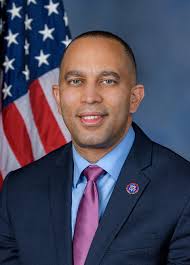
Introduction
Hakeem Jeffries, the current House Minority Leader and representative from New York’s 8th congressional district, has quickly become a prominent figure in U.S. politics. As the first African American to lead a major party in Congress, his role is of critical importance, particularly in shaping the future of the Democratic Party in a politically polarized landscape. His leadership comes at a time when voters are increasingly looking for solutions to pressing issues like healthcare, the economy, and social justice.
Career Overview
Jeffries was elected to Congress in 2012 and has risen through the ranks with a focus on legislation that addresses inequality and promotes economic opportunity. His advocacy for criminal justice reform, access to affordable healthcare, and education has garnered him respect across the aisle. In 2023, Jeffries was elected as House Minority Leader, succeeding Nancy Pelosi, a role that places him at the forefront of the Democrats’ response to Republican policies and agendas.
Recent Achievements and Challenges
This past year, under Jeffries’ leadership, the Democratic Party has attempted to unify its members around key initiatives. In his first months as House Minority Leader, he emphasized the necessity for the party to focus on economic issues that resonate with everyday Americans. He launched several outreach campaigns aiming to engage diverse communities and highlight the impacts of recent legislation. However, Jeffries faces significant challenges, including navigating a Republican-controlled House and fostering party cohesion amidst ideological divides.
Public Response and Future Outlook
Public response to Jeffries’ leadership has been mixed but generally optimistic among Democratic constituents. He has been praised for his articulate communication and dedication to progressive values, resonating particularly strongly with younger voters. Looking ahead, expect Jeffries to play a pivotal role in the 2024 elections as he strives to define the Democratic message and respond effectively to issues impacting the electorate.
Conclusion
Hakeem Jeffries stands as a consequential leader whose influence may shape the Democratic Party’s future in significant ways. As he faces the challenges of leadership in a divided Congress, his ability to unify his party and focus on core issues may determine the party’s success in upcoming elections. Jeffries’ rise signals a shift towards a younger, more diverse leadership aimed at addressing the needs and concerns of all Americans.



